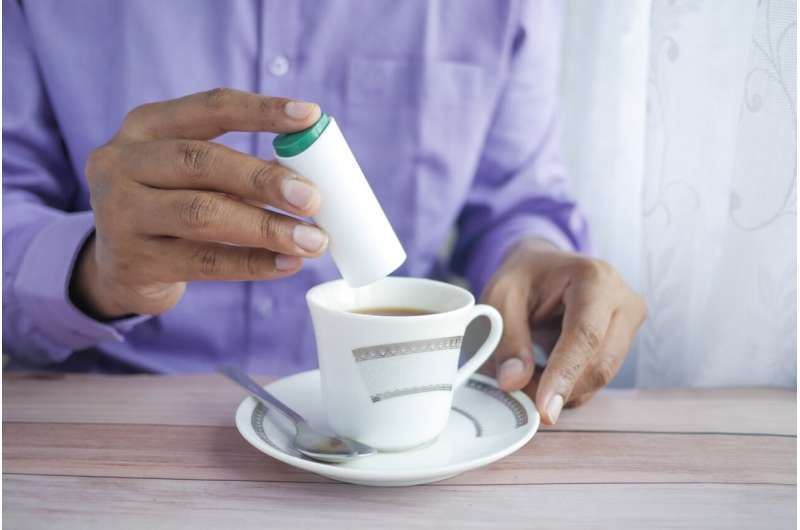
Credit: Unsplash/CC0 Public Domain
The World Health Organization has come out against the use of non-sugar sweeteners (NSS) as a means to control weight or limit non-communicable sickness.
“The recommendation is based on the findings of a systematic review of the available evidence which suggests that the use of NSS does not confer any long-term benefits in reducing body fat in adults or children,” WHO said in a statement Monday.
That review also determined long-term use of NSS could contribute to type 2 diabetes, cardiovascular diseases and serious illness in adults.
“Replacing free sugars with NSS does not help with weight control in the long term,” WHO Director for Nutrition and Food Safety Francesco Branca said in a statement. “NSS are not essential dietary factors and have no nutritional value.”
Branca suggests people reduce consuming sweets altogether, starting at an early age.
Aspartame, advantame, cyclamates, neotame, saccharin, sucralose and stevia are among the additives addressed in WHO’s review. Most of those substitutes are associated with brand names like Sweet’N Low, Equal and Splenda. They’ve all been approved by the US Food & Drug Administration.
Sugar alcohols containing calories, such as polyols, aren’t considered NSS.
WHO, a United Nations agency headquartered in Switzerland, called for adults and children to make free sugars—including glucose, fructose and table sugar—less than 10% of their total energy intake in 2015.
“We have solid evidence that keeping intake of free sugars to less than 10% of total energy intake reduces the risk of overweight, obesity and tooth decay,” Branca said following the report.
Monday’s recommendation to reduce NSS consumption does not apply to people with diabetes, nor does it continue to medication. WHO’s findings do not pertain to personal care products including toothpaste and skin care goods either. The review included more than 320 studies.
The International Sweeteners Association suggests taking WHO’s “conditional finding” with a grain of salt.
“In light of the global effort to address the burden of non-communicable diseases (NCDs), including dental diseases which are the most prevalent NCDs globally, and other societal challenges such as the global obesity crisis, the ISA believes it is a disservice to public health to not recognize low-/no-calorie sweeteners’ role in reducing sugar and calorie intake and aiding in weight control,” that organization said Monday.
The ISA claims approved low and no-calorie sweeteners “have a role to play in the fight against obesity,” when used in place of sugar and “are an essential tool in helping food and drink companies reformulate products, to reduce the amount of sugar and calories contained.”
2023 New York Daily News.
Distributed by Tribune Content Agency, LLC.
Citation: WHO: Artificial sweeteners have no weight-loss benefit, may raise health risks (2023, May 15) retrieved 26 May 2023 from https://medicalxpress.com/news/2023-05-artificial-sweeteners-weight-loss-benefit -health. html
This document is subject to copyright. Apart from any fair dealing for the purpose of private study or research, no part may be reproduced without the written permission. The content is provided for informational purposes only.



